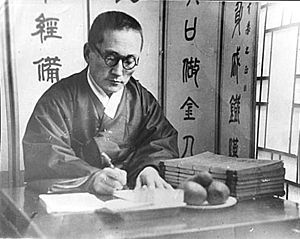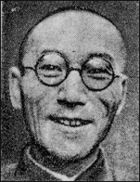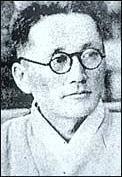Yi Gwangsu facts for kids
Quick facts for kids
Yi Gwangsu
|
|
|---|---|
 |
|
| Native name |
이광수; 리광수
|
| Born | February 1, 1892 Gwangdong-ri, Galjitong, Jeongju-gun, Pyeongan-do, Korean Empire (Currently Chongju, North Pyongan Province, North Korea) |
| Died | October 25, 1950 (aged 58) |
| Occupation | Novelist |
| Language | Korean |
| Nationality | Korean |
| Spouse | Heo Young-sook |
| Children | 5 |
| Korean name | |
| Hangul | |
| Hanja | |
| Revised Romanization | I Gwangsu |
| McCune–Reischauer | I Kwangsu |
Yi Gwangsu (Korean: 이광수; 1892–1950) was a famous Korean writer and poet. He was known as a Korean independence activist for a time. Later in his life, he worked with the Japanese during their rule over Korea. His pen names, which are like nicknames for writers, were Chunwon and Goju. Yi Gwangsu is most famous for his novel Mujeong (Heartless). Many people consider this book to be the first modern Korean novel. He was born Yi Bogyeong on February 1, 1892.
Contents
Early Life and Education
Yi Gwangsu was born in 1892 in a place called Jeongju. When he was about 10 years old, he became an orphan, meaning both his parents had died. He then grew up with people who followed the Donghak religion.
In 1904, around the time of the Donghak Peasant Revolution, he moved to Seoul. He did this to avoid problems with the authorities. The next year, in 1905, he traveled to Japan to get an education.
Return to Korea and Activism
After finishing his studies, Yi Gwangsu came back to Korea in 1913. He started teaching at Osan School in Jeongju. Later, he moved back to Tokyo, Japan. There, he became an important leader for Korean students who were against colonial rule.
In 1919, he moved to Shanghai, China. He worked for the Korean Provisional Government, which was a government-in-exile for Korea. He also became the president of The Independent, a newspaper published in Shanghai.
Yi returned to Korea in 1921. He started a group called the Alliance for Self-Improvement. This group aimed to help Koreans improve themselves and become more modern.
Journalism and Later Years
From 1923 to 1934, Yi Gwangsu worked as a journalist. He wrote for several newspapers. Two of these newspapers, the Dong-a Ilbo and the Chosun Ilbo, are still published today.
In 1937, Yi faced difficulties because of something called the Self-Cultivation Friendship Association incident. He was held for about six months but was released due to illness. During this time, he changed his views. He stopped being against Japan and started to support their rule.
In 1939, Yi became the first leader of the pro-Japanese Korean Writers Association. He led strong efforts to make Korea more like Japan. He even adopted a Japanese name, Kayama Mitsurou, when a new policy called Sōshi-kaimei came into effect. This policy encouraged Koreans to change their names to Japanese ones.
After Korea gained independence in 1945, Yi Gwangsu went to the countryside. In 1949, he was arrested because of his cooperation with the Japanese. A group called the Special Investigation Committee of Anti-National Activities found him responsible for these actions. In 1950, during the Korean War, Yi was captured by the North Korean army. He passed away in Manpo on October 25, likely from tuberculosis.
Family Life
Yi Gwangsu had two younger sisters, Lee Ae-Kyung and Lee Ae-Ran. He was married twice. His first wife was Heo Young-sook, and his second wife was Baek Hye-soon. He had three sons: Lee Jin-keun, Lee Pong-keun, and Lee Young-keun. He also had two daughters: Chung-Nan Lee Kim and Chung-Wha Lee Lyenger.
Literary Works and Themes
Yi Gwangsu was a writer of fiction and essays. His early essays often talked about the need for Koreans to have a strong national identity. His fiction was some of the first modern writing in Korea. He is most famous for his novel, Mujeong (The Heartless).
Mujeong described Korea at a turning point. The country was caught between old traditions and new modern ideas. It also showed the conflict between real-life situations and traditional ideals.
Periods of His Writing
Yi's writing career can be divided into three main parts:
- First Period (1910-19): This period included Mujeong. His writing strongly criticized Korea's traditional society. He believed Korea should adopt more modern, Western ways of thinking.
- Second Period (Early 1920s to 1930s): During this time, Yi became a strong supporter of Korean nationalism. He wrote a well-known essay called "On the Remaking of National Consciousness." In it, he suggested that Koreans needed to improve their morals. He also blamed Koreans for being too easily defeated.
- Third Period (1930s onwards): This period happened after Yi became a Buddhist. His writing started to show Buddhist ideas. This was also the time when he began to cooperate with the Japanese.
Yi's opinions could change, much like his political views. For example, he was friends with another writer, Kim Myeong-sun, but then stopped supporting her. This was supposedly because his ideas about modernism had changed.
Selected Works
- Is It Love (사랑인가 愛か), 1909
- Mujeong (Heartless) (무정), 1917
- Crown Prince Maui (마의태자 麻衣太子), 1928
- Danjong Aesa (단종애사 端宗哀史), 1929
- Soil (흙), 1932
- Love (사랑), 1938
- Ambassador Wonhyo (원효대사)
- Biography of Yi Sun-sin (전기 이순신)
- Biography of Ahn Changho (전기 안창호)
Translated Works in English
- Mujŏng, translated by Ann Sung-Hi Lee (Cornell University: Cornell East Asia Series, 2005) ISBN: 978-1-885-44537-7
- The Soil, translated by Sun-Ae Hwang and Horace Jeffrey Hodges (Dalkey Archive Press, 2013) ISBN: 978-1-564-78911-2
- Kashil and Best Essays by Yi Kwang-su, translated by Chung-Nan Lee Kim (Archway Publishing, 2014) ISBN: 978-1-480-81363-2
Images for kids
See also
 In Spanish: Yi Kwang-su para niños
In Spanish: Yi Kwang-su para niños
 | Emma Amos |
 | Edward Mitchell Bannister |
 | Larry D. Alexander |
 | Ernie Barnes |




